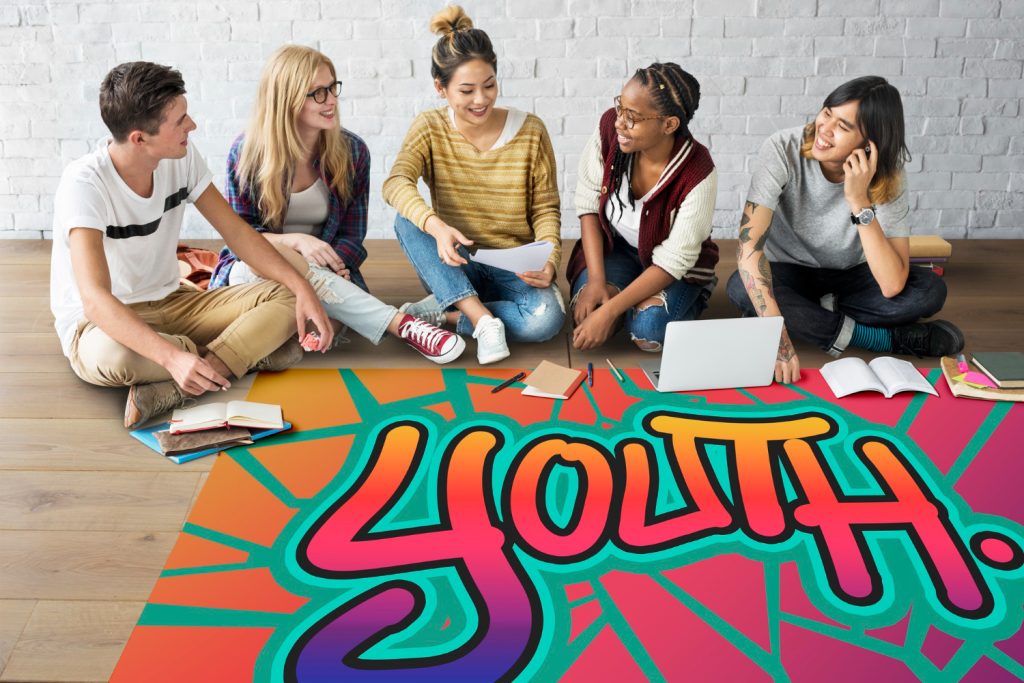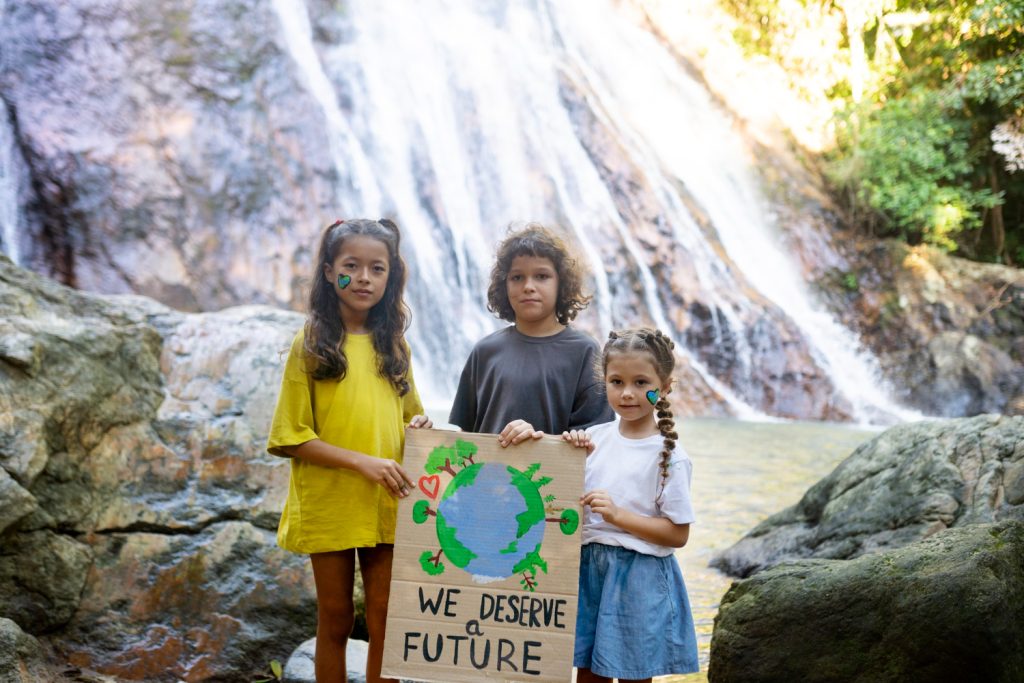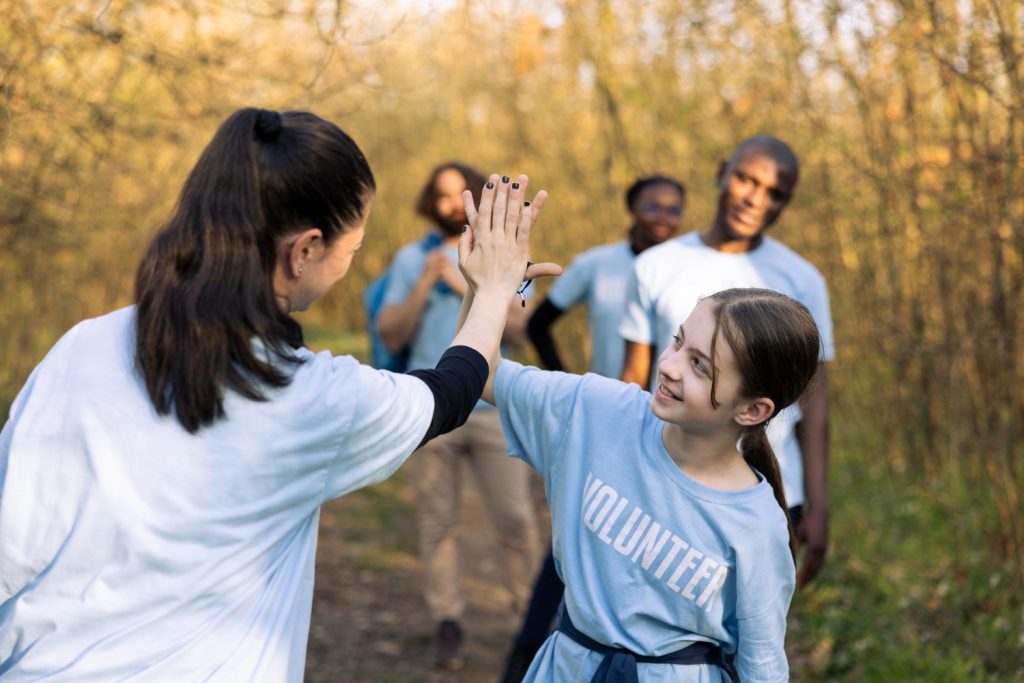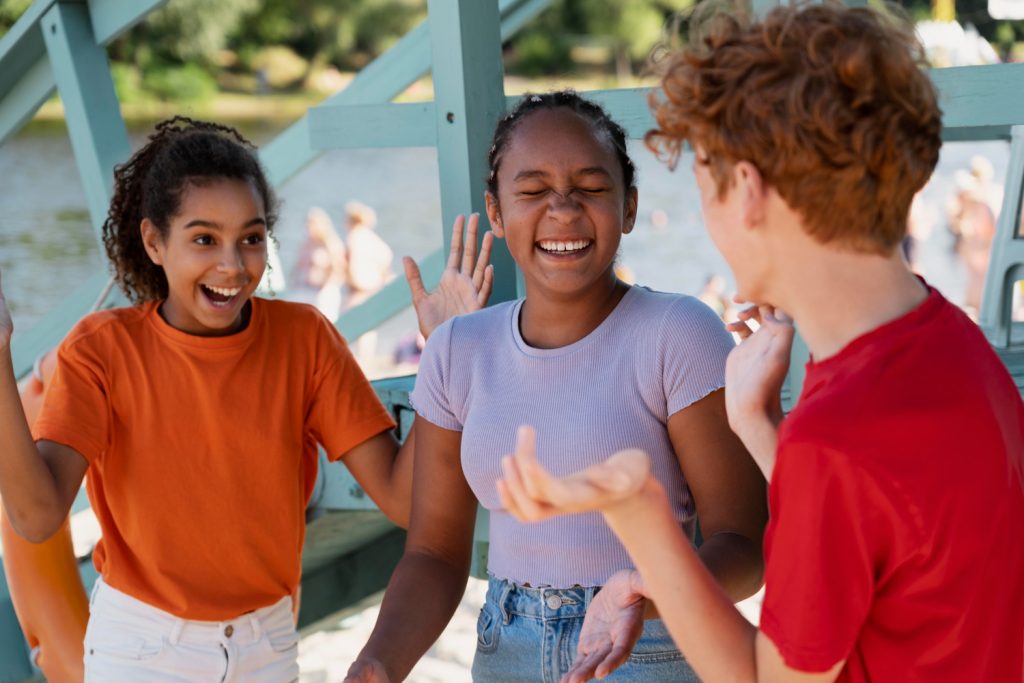About Alliance Youth Works

Alliance Youth Works awakens in addition to educating. This Northern Irish charity has been incredibly successful in helping kids and teens rediscover their connection to the natural environment since its modest beginnings at Benburb Castle. Its programs encourage students to experience the environment as a living classroom rather than just study it by fusing science, faith, and curiosity in novel and refreshing ways.
Alliance Youth Works has been transforming outdoor learning into a profoundly human experience for more than ten years through its flagship program, Eden (EDucation in the ENvironment). The organization fosters awe that textbooks can hardly convey by bringing students into fields, forests, and coastlines. Eden has worked with schools in the Newry and Mourne area for the past ten years, creating immersive day trips that are suitable for all weather conditions and seasons.
Instructors frequently comment on how well-balanced, incredibly clear, and highly relevant the programs are to the Revised Curriculum. Every activity, from pond dipping to birdwatching, aims to make science more relatable and tangible. Youngsters learn by being rather than by memorization; they learn by touch, sound, and observation. Focus and long-term memory have been shown to be significantly enhanced by this multisensory approach, especially for students who do best in experiential learning environments.
Alliance Youth Works offers a link for educators looking to incorporate STEM ideas into the natural world. It infuses learning with vitality by converting scientific theory into outdoor practice. Students are able to study ecosystems, recognize species, and interact with sustainability in a dynamic way. Lessons are kept both physically and intellectually interesting by incorporating orienteering, woodland exploration, and mapping challenges.
But its ethos is more profound than academic. According to Alliance Youth Works, empathy and education are inextricably linked. Children learn a more comprehensive lesson about responsibility—to themselves, to others, and to creation—by being encouraged to take care of their surroundings. This is how the charity’s Christian roots subtly mesh with contemporary teaching methods. Instead of preaching, it exemplifies faith via stewardship, compassion, and the patient act of nurturing.
This mission has relied heavily on partnerships. Alliance Youth Works offers residential biodiversity programs that blend environmental study with introspection in partnership with the Castlewellan Castle Christian Conference Centre. Through these experiences, young people can see how science and spirituality can coexist peacefully and how observation can lead to both awe and knowledge. At a time when many educational institutions are having difficulty balancing belief and reason, this approach feels especially novel.
Through biodiversity audits, on-site advisory visits, and after-school eco-clubs, the charity has broadened its scope over the years. Schools that want to improve their environmental impact can ask AYW for advice on introducing native species, planting habitats, or developing sustainable grounds. AYW adjusts to tight budgets by holding sessions in nearby parks or schoolyards. Because of its adaptability, its programs are incredibly effective and reasonably priced, guaranteeing that no child is denied the chance to engage with nature.
Its services are remarkably affordable. Alliance Youth Works has established itself as an inclusive educational ally by offering outreach visits that are tailored to meet local needs and sessions that start at just £3.50 per student. Its belief that environmental awareness should never be a privilege but rather a shared civic right is further supported by its accessibility.
Initiatives like AYWs have gained new significance in recent years as society has become more urbanized. A return to tactile, grounded learning is a quiet but significant trend in education that is reflected in the organization’s work. AYW provides contrast in an age where digital screens are everywhere: the sound of rustling leaves takes the place of the hum of technology, and a kingfisher replaces a pixelated video clip.
In addition to educators, environmentalists and public leaders throughout Northern Ireland have expressed their admiration for this emphasis on authenticity. Many liken AYW’s grassroots approaches to the ideas of trailblazers like Sir David Attenborough, who has long maintained that genuine conservation starts with curiosity. That relationship between adolescent wonder and adult stewardship is central to Alliance Youth Works’ mission.
Another essential component is still community involvement. AYW guarantees that the impact lasts beyond the day’s activities by providing training to volunteers, instructors, and leaders. Lessons gained outdoors have a knock-on effect, changing the way local organizations, church groups, and families view sustainability. The initiative’s participation in the Eco-Schools program lends it additional legitimacy by showcasing its ability to convert environmental theory into quantifiable school-wide advancements.
Alliance Youth Works has evolved into a subtly revitalizing force in Northern Irish education in many respects. It encourages collaboration, leadership, and curiosity while questioning traditional classroom boundaries. It has significantly raised outdoor education standards with its customized experiences, establishing a precedent that others are starting to follow.
Its operational base, Benburb Castle, provides a symbolic backdrop—a stronghold of the past that is now a basis for the future. Instead of fighting, ideas are blossoming inside those stone walls. The setting connects heritage and hope, giving the charity’s mission more gravity. It seems as though history itself is supporting a new style of leadership, one that uses empathy instead of force.
The way Alliance Youth Works functions is subtly inspiring; it is patient, grounded, and uncompromisingly progressive. It accomplishes something deeply human on a small scale. Children’s laughter as they learn to identify insects or plant trees turns into an anthem of change rather than just noise.
The charity is creating better citizens as well as better students by enabling the next generation to comprehend their role in the natural world. These kids grow up to be adults who understand that community care extends to the environment, a concept that cuts across politics and geography.
| Name | Alliance Youth Works (AYW) |
|---|---|
| Founded | 2016 |
| Based at | Benburb Castle, 10 Main Street, Benburb, Northern Ireland |
| Type | Registered Charity and Educational Organisation |
| Key Programmes | EDucation in the ENvironment (Eden); Eco-Schools; After-School Nature Clubs; Biodiversity Residentials |
| Main Focus | Environmental Education; Youth Empowerment; Community Development; Faith-Based Learning |
| Partnerships | Castlewellan Castle Christian Conference Centre; Local schools across Newry & Mourne District |
| Website | https://allianceyouthworks.org.uk |
Latest
Eden (EDucation in the ENvironment)

By fusing scientific curiosity with a deep emotional connection to nature, Eden (EDucation in the ENvironment) has gradually developed into one of Northern Ireland’s most admired educational initiatives. Its goal is straightforward but profound: to encourage youth to recognize, value, and preserve the environment they live in. The program, which is run by Alliance Youth Works, is especially creative in that it transforms even the most basic outdoor areas into vibrant ecosystems for learning.
Eden has significantly enhanced how kids participate in environmental education over the last ten years. Because of its purposefully pragmatic structure, education feels real and alive. Students find themselves outdoors rather than in sterile classrooms, where they can identify birds, track insects, test water samples, or navigate maps through forests. This practical method has proven to be incredibly successful in fostering curiosity, collaboration, and a sincere sense of environmental responsibility.
Teachers who bring their students to Eden often say the sessions are very effective and very clear. Every program is created with clear connections to STEM outcomes and the Revised Curriculum, guaranteeing that outdoor learning enhances rather than replaces academic goals. Students learn through observation and action by investigating habitats, carrying out small-scale field experiments, and considering biodiversity. This approach is much more effective than traditional instruction alone at fostering understanding.
Eden’s inclusivity is arguably what sets it apart the most. Due to the program’s surprisingly low cost (just £3.50 per student), even schools with limited funding can participate. Eden adjusts when transportation becomes an obstacle. The team makes sure that no child misses the experience by bringing its lessons to nearby parks or school grounds. Because of this flexibility, outdoor learning is now a right rather than a luxury, reflecting the charity’s strong commitment to sustainability and equity.
Every activity has a goal and is interesting. Youngsters map woodland trails, investigate ponds brimming with life, and examine the footprints of small mammals. During one lesson, a teacher explained how the class was mesmerized by the silent genius of nature as they watched tadpoles change. These experiences are not only instructive; they are also transforming, fostering patience and empathy in ways that textbooks seldom do.
Through residential programs on biodiversity, Eden’s partnership with Castlewellan Castle Christian Conference Centre expands on this strategy. By fusing spiritual reflection with scientific investigation, these overnight experiences foster deeper connection and introspection. The environment, which is encircled by lakes and forests, fosters an environment where learning feels natural, intimate, and timeless. In addition to knowledge, students depart with a new perspective and an understanding that caring for the environment is both a responsibility and a pleasure.
This harmony of thought and feeling reflects a broader cultural change. Environmental advocates and educational leaders throughout Europe are realizing more and more that theory alone is insufficient to attain environmental literacy. The lessons that children learn must be seen, felt, and inhaled. That is precisely what Eden’s programs do: they turn ecological ideas into real-world experiences. Students gain an understanding of the connection between care and comprehension by exploring meadows or the soil beneath their shoes.
The way Eden has subtly impacted nearby communities is especially encouraging. The nonprofit teaches kids how to plant pollinator gardens and keep an eye on local wildlife through its after-school eco-clubs and youth programs. Many of these initiatives have grown into local customs, bringing teachers and families together to perform small-scale environmental restoration. Little actions taken frequently result in long-lasting cultural change, and the combined effect is potent.
Many people agree that this model has advantages. Children who learn outdoors exhibit better problem-solving abilities, increased emotional resilience, and stronger concentration, according to experts in environmental education. Through the integration of STEM and natural exploration, Eden has produced outcomes that are enriching for both individuals and the classroom. By substituting streams for screens and data charts for bird sounds, it has also greatly decreased the reliance on technology that frequently stifles creativity.
The effectiveness of the program is praiseworthy from a structural standpoint. Every day proceeds without a hitch thanks to skilled facilitators who strike a balance between spontaneity and safety. They are aware that unexpected events, like a sudden rustle in the reeds or an unexpected encounter with a dragonfly, frequently provide the most memorable teaching opportunities. These brief encounters, accompanied by kind explanation, leave enduring impressions.
Eden supports schools that want to improve sustainability by working closely with Eco-Schools Northern Ireland. It offers helpful guidance on waste minimization, biodiversity initiatives, and designing outdoor classrooms. The assistance is practical, adapted to the requirements of each location, and frequently lasts longer through continuous mentoring. Schools creating long-term environmental plans have benefited greatly from this continuity.
The strategy has received praise from people outside of the education community. Local leaders and environmentalists have commended Eden for its sustainable model and grassroots authenticity. Here, there are only regular, significant interactions rather than elaborate campaigns or catchphrases. Early conservation efforts by naturalists and educators, who held that awareness starts with presence rather than policy, were characterized by this same kind of quiet effectiveness.
The program was once referred to as “the heartbeat of environmental education” by a Newry teacher, which is a fitting metaphor for something that runs silently but continues to promote learning everywhere it goes. The program builds legacy rather than chasing fame. Eden makes sure that environmental consciousness becomes self-renewing by fostering curiosity and concern in its students.
The program’s base, Benburb Castle, has its own meaning. Its transformation from a fortress to a learning sanctuary reflects Eden’s goal of transforming inflexible educational systems into adaptable, real-world experiences. Children congregate in those historic halls before exploring the outdoors, connecting centuries of history with the hope of a sustainable future.
Additionally, Eden’s impact transcends its immediate geographic location. Its community-based, flexible, and reasonably priced approaches offer a scalable model for comparable initiatives in other locations. The initiative challenges educational institutions to reconsider the design of learning environments by demonstrating that outdoor education can be both soulful and structured. It implies that education is about fostering relationships—between people, ideas, and the land itself—rather than just imparting knowledge.
The simplicity of Eden (EDucation in the ENvironment) feels almost revolutionary at a time when kids are becoming more and more cut off from nature. It invites rather than lectures. It inspires rather than imposes. It brings back something subtly lacking with every muddy footprint and mutual discovery: a feeling of balance, belonging, and learning joy that is surprisingly ageless.
| Programme Name | Eden (EDucation in the ENvironment) |
|---|---|
| Launched | 2016 |
| Operated By | Alliance Youth Works, Northern Ireland |
| Headquarters | Benburb Castle, 10 Main Street, Benburb, Northern Ireland |
| Nature of Programme | Environmental and Outdoor Education for Schools |
| Core Focus | Environmental Awareness; Biodiversity; Outdoor Learning; Youth Empowerment; STEM Integration |
| Main Themes | Birds, Pond Dipping, Woodlands, Mammals, Mini-beasts, Seashore, Mourne Mountains, Ring of Gullion, Orienteering, Team Building, Senses Exploration |
| Duration | One-day sessions (10:00 AM – 2:00 PM) |
| Cost | £3.50 per pupil (plus small activity and outreach fees) |
| Key Partners | Castlewellan Castle Christian Conference Centre; Eco-Schools Northern Ireland |
Importance Of Charity Organizations And Youth Empowerment Programs In Northern Ireland

Since they accomplish the dual goals of mending the social fabric and increasing opportunity in ways that policy alone frequently cannot, charity organizations and youth empowerment initiatives in Northern Ireland function as a dense network of tiny bridges, subtly reuniting neighborhoods and aspirations that once felt divided by history and inequality. Their combined significance cannot be overstated.
While formal services may seem remote and bureaucratic, charities frequently arrive swiftly, flexibly, and with a certain relational intelligence that turns one-time interventions into long-term gains. These organizations work across overlapping terrains, including mental health, education, employment, and reconciliation, and they do so with a practical, hands-on ethic that is remarkably effective.
Think about mental health services. Peer-led support that is remarkably sympathetic and, in many cases, measurably lessens stigma is offered by groups like Aware NI and local counselling initiatives. Adolescents who join these programmes with symptoms of anxiety or depression often mention the peer-group component as being especially helpful because it replaces isolation with camaraderie and useful coping mechanisms. Restored confidence has a positive impact on school attendance, family engagement, and the likelihood of seeking additional help when necessary. The effect is not just clinical.
Programs for youth empowerment also tackle economic precarity in a very useful way. Young Enterprise Northern Ireland fosters financial literacy and entrepreneurial confidence that lasts long after a single term is over by combining classroom instruction with mentor-led business projects. Students who previously viewed entrepreneurship as an unattainable goal start to see practical routes to employment and independence; through budgeting, mentoring, and pitching, they acquire skills that employers value, particularly as the local economy shifts toward the tech and green sectors.
Another powerful illustration of programmatic leverage can be found in sport-based reconciliation initiatives, such as PeacePlayers Northern Ireland. The charity has consistently promoted friendships and leadership among young people from segregated communities by using basketball as a structured environment for interaction and communication. Over the course of several seasons, these athletes frequently transition from mistrust to empathy before taking on positions as coaches or community leaders. Because it develops through repeated cooperative activity rather than a single, performative event, the social capital created by these relationships is especially resilient.
Work that focuses on inclusion also demonstrates the significance of these programs. For young people with learning disabilities, Mencap NI’s FIVE project shows how focused engagement that combines social skills, independence training, and creative workshops can result in noticeable gains in wellbeing and community involvement. Parents frequently report that their children come out of school with notably stronger social networks and confidence; these are not incidental advantages, but fundamental changes that reshape opportunities in life.
On the other hand, organizations that support LGBTQ+ youth, like Cara-Friend, establish safe spaces that have a profoundly transformative impact. These hubs provide advocacy, resources, and a sense of belonging in situations where acceptance may be uneven, preventing the crises that are frequently linked to rejection based on identity. The practical implications are obvious: youth who experience a sense of being seen and supported are more likely to complete their education, build lasting relationships, and make constructive contributions to society.
Additionally, charities are essential partners in the delivery of formal education, bringing the classroom into the creative, outdoor, and vocational domains. By making science tactile through activities like pond-dipping, mapping, and species surveys, Alliance Youth Works’ EDucation in the ENvironment program, Eden, transforms schoolyards into laboratories of biodiversity and STEM practice. This increases curiosity, decreases reliance on screens, and yields learning outcomes that educators describe as remarkably clear and durable. These programs are surprisingly inexpensive and frequently replicable, which is crucial for financially strapped schools.
The community and nonprofit sectors offer a form of resilience insurance on a systemic level. In order to enable frontline groups to grow responsibly, infrastructure organizations such as YouthLink NI and NICVA provide staff training, accredit safeguarding procedures, and facilitate funding partnerships. Many locally based programs would fail as they tried to become more professionalized without that middle tier; strong governance and training ensure that grassroots innovation is long-lasting rather than sporadic.
The aspect of peacebuilding is not hypothetical. Targeted outreach through charities now provides credible alternatives to paramilitary recruitment, which once attracted young people into violent cycles. Leadership programs, organized sports, and vocational training serve as diversionary opportunities that have greatly decreased the number of at-risk youth in many neighborhoods. These changes are gradual but significant because they change people’s lives one at a time.
Historically unstable funding models are changing for the better. Organizations can plan beyond a single season thanks to diaspora philanthropy and multi-year grants from trusts, which makes longitudinal evaluation and mentorship cohorts feasible. For instance, transatlantic support has been directed towards enterprise education by Friends of Young Enterprise Northern Ireland, enabling programs to transition from pilot stages to permanent curricula. This change, according to practitioners, is incredibly resilient: consistent funding leads to consistent relationships, which in turn lead to quantifiable results.
Cross-sector collaborations increase the impact even more. The outcome is programming that combines complementary expertise while sharing administrative burdens, such as when schools collaborate with nonprofits on Eco-Schools projects or when health services provide trauma-informed coaching through sport programs. These partnerships are very effective, reaching a wider audience without incurring duplicate expenses, and they frequently lead to noticeably better community cohesion and student wellbeing.
Celebrity and cultural endorsements can occasionally bring campaigns into the public eye, raising awareness and donations, but the most important work is still done by volunteers, youth workers, and local leaders on a daily basis. Anecdotes, such as a young coach who gained leadership skills from PeacePlayers and went on to train others, a shy student who found a voice while pitching an enterprise idea, and a family whose relationship was maintained by consistent support from Barnardo’s NI, are a better way to illustrate this than statistics. These unique stories—small, human, and cumulative—are the true currency of social change when multiplied across geographical boundaries.
The economic argument is strong as well. Investing in youth programming fosters the next generation of business owners, social innovators, and community leaders while also lowering long-term public costs through increased civic engagement, better employability, and a decreased demand for crisis services. Strategically allocating small grants to well-established programs can yield disproportionately large dividends during a period of tight public budgets.
| Name | Importance of charity organizations and youth empowerment programs in Northern Ireland |
|---|---|
| Scope | Social inclusion, mental health, education, employability, peacebuilding, community regeneration |
| Representative organisations | YouthAction NI; Barnardo’s NI; Young Enterprise NI; PeacePlayers NI; Cara-Friend; Habitat NI; Mencap NI; Aware NI; Eden (Alliance Youth Works); YouthLink NI |
| Key activities | Leadership training; sport-based reconciliation; enterprise education; mental-health support; eco-education; inclusive youth projects |
| Regional focus | Belfast, Derry/Londonderry, Newry, Enniskillen, Armagh, Lisburn and county-wide outreach |
List of Charity Organizations and Youth Empowerment Programs in North Ireland

YouthAction Northern Ireland and Barnardo’s Northern Ireland serve as examples of how institutional depth and innovative agility can coexist: While YouthAction uses arts, leadership development, and mental health programs to raise aspirations and give young people useful pathways into the workforce and civic life, Barnardo’s uses decades of casework and specialized safeguarding to stabilize families and children through fostering and refugee support.
By working with local businesses to teach pitching, budgeting, and problem-solving techniques, Young Enterprise Northern Ireland has been especially successful in transforming entrepreneurship from abstract concepts into practical application. By putting mentors in classrooms and implementing school-based company schemes, the charity has significantly increased financial literacy and career confidence among students who might otherwise view opportunity as far away.
By matching young people from segregated communities in basketball hubs that combine coaching and conflict-resolution education, PeacePlayers Northern Ireland uses sport as a remarkably effective tool for reconciliation. Over time, these programs have developed enduring friendships and leadership abilities, demonstrating that shared activity can be one of the most useful ways to overcome division and develop social capital.
Large institutions may not always be able to match the intimacy with which grassroots organizations like Cara-Friend and BulliesOut operate. Cara-Friend provides safe youth services and networks for LGBTQIA+ youth, while BulliesOut offers anti-bullying education and resilience training that is remarkably tailored to local needs, reducing isolation and establishing peer-led platforms for ongoing support.
Targeted inclusion is crucial, as shown by Mencap Northern Ireland and the FIVE project. By creating activities for youth with learning disabilities, these programs have significantly increased wellbeing and social confidence, and after just one cohort, parents have reported significant increases in independence and social participation. This shows that well-tailored youth services can have long-term positive effects that affect families and communities.
Humanity’s Habitat By recruiting young volunteers for construction projects and Habitat ReStores, which teach practical skills while promoting reconciliation and housing justice, Northern Ireland adds a civic, hands-on dimension to youth engagement. For many participants, civic service is a credible path to employability because the experience of helping repair a home or rebuild a community space is both emotionally and vocationally formative.
Digital risks have prompted organizations like Childnet and Internet Matters to create peer-led online safety programs. These programs are much more effective at changing behavior than one-time assemblies because they encourage continuous dialogue and useful toolkits rather than sporadic warnings. These nonprofits collaborate with schools to integrate digital resilience so that youth can use technology responsibly and with confidence.
Peer mentoring, anonymous reporting tools, and therapeutic group work are some of the pragmatic interventions used by Ditch the Label and other anti-bullying charities to address the emotional fallout of adolescence. These interventions have been shown to be particularly effective at restoring agency and encouraging the seeking of mental health help, making them a valuable addition to clinical services and school counselors.
Many small charities would find it difficult to maintain high-quality programs after pilot phases without the assistance of infrastructure bodies like YouthLink NI, NICVA, and CommunityNI, which play a less obvious but incredibly effective role in training youth workers, accrediting safeguarding practices, and facilitating funding partnerships that allow frontline organizations to scale consistently.
Smaller initiatives also foster local innovation, such as play-based anti-bullying workshops that use art, drama, and conversation to create behavioral change; school-based kindness campaigns that teach civic empathy; and surf-therapy groups that combine ocean sessions with trauma-informed coaching. These practical methods are frequently surprisingly accessible, replicable, and in line with the lived experiences of young people.
Although funding has always been a challenge, new diaspora foundations and philanthropic channels, like Friends of Young Enterprise Northern Ireland, are experimenting with stable multi-year grants that enable organizations to transition from episodic interventions to deep, longitudinal mentorship. Practitioners say this approach is particularly durable because it fosters relationships rather than box-checking.
Cross-sector partnerships are becoming more prevalent and are especially creative. For example, charities work with schools on Eco-Schools projects and outdoor education programs, connect with health services to offer trauma-informed coaching, and invite business partners to offer mentoring and apprenticeships. These partnerships increase impact by enabling each partner to share administrative burdens and contribute unique expertise.
The most significant advancements are still made by the patient, everyday work of local youth workers, volunteers, and teachers who maintain programs through relationships rather than publicity. Celebrity endorsements and public figures occasionally increase visibility and fundraising—when well-known supporters support mental-health drives or anti-bullying campaigns, public attention spikes and donations surge.
An isolated teen who found community at a Cara-Friend youth hub; a student who discovered entrepreneurship through Young Enterprise and later founded a social business; a young person who learned to lead through a PeacePlayers session and later received coaching training—these unique stories, multiplied across regions, become the currency of long-term social change and compelling evidence for scaled investment.
The most transferable components are clear local partnerships, affordable pricing, flexible delivery that includes school-based options when transportation is limited, and ongoing workforce development for youth practitioners. When these combine, these elements create initiatives that not only respond to crises but also generate leadership and resilience at scale. Practical replication is possible when programs are purposefully low-cost, community-rooted, and adaptable.
The case for continued investment in youth charities is becoming stronger in the current policy environment, where funding is scarce and competing with priorities related to mental health and educational attainment. Small, consistent grants allow programs to mentor cohorts, establish trust, and produce quantifiable results in terms of civic engagement, employability, and wellbeing—outcomes that, taken together, lower long-term public costs while fostering the next generation of community leaders.
These locally anchored programs demonstrate how education can be both demanding and restorative. One example from Northern Ireland demonstrates the power of place-based learning: Alliance Youth Works’ environmental education program Eden turns schoolyards into living laboratories, teaching ecology, STEM, and stewardship through hands-on sessions that are remarkably effective at restoring curiosity and reducing screen-dependence.
| Name | Founded | Core Focus | Key Programmes & Activities | Headquarters / Region | Reference |
|---|---|---|---|---|---|
| Barnardo’s Northern Ireland | 1867 (UK) / Operating in NI since 1899 | Supporting children, families, foster care, refugee support, child protection | Family support, educational inclusion, fostering services, counselling | Belfast | barnardos.org.uk |
| YouthAction Northern Ireland | 1944 | Youth leadership, arts, mental health, education, community development | Leadership training, performing arts, volunteering networks, youth wellbeing | Belfast, Armagh, Newry, North West | youthaction.org |
| Young Enterprise Northern Ireland (YENI) | 1980 | Enterprise education, entrepreneurship, financial literacy | Company programme, business masterclasses, innovation bootcamps, school workshops | Lisburn | yeni.co.uk |
| PeacePlayers Northern Ireland | 2003 | Sports-based reconciliation and youth leadership | Basketball training, cross-community leagues, leadership development, coaching academy | Belfast, Larne, Newry, Dungannon | peaceplayers.org |
| Cara-Friend | 1974 | LGBTQIA+ youth support, equality, inclusion, mental health | Belfast LGBTQIA+ Youth Centre, school outreach, mentoring, community education | Belfast | cara-friend.org.uk |
| Habitat for Humanity Northern Ireland | 1994 | Housing, community development, volunteering, peacebuilding | Habitat ReStore, youth volunteer projects, reconciliation builds, global village trips | Lisburn | habitatni.co.uk |
| BulliesOut | 2006 | Anti-bullying education, youth empowerment, mental health awareness | Peer mentoring, kindness campaigns, training workshops, digital resilience programmes | Belfast (operating UK-wide) | bulliesout.com |
| Mencap NI — FIVE Youth Project | 2019 | Inclusion for young people with learning disabilities, health & wellbeing | Friendship, independence and social skills development through youth workshops | Greater Belfast & Fermanagh/Tyrone | mencap.org.uk |
| YouthLink NI | 1998 | Youth worker training, inter-community education, peacebuilding | Cross-community training, citizenship education, leadership programmes | Belfast | youthlink.org.uk |
| Aware NI | 1996 | Mental health, depression, resilience, peer support | Support groups, mental health education in schools, wellbeing campaigns | Belfast & Derry | aware-ni.org |
| Early Years — The Organisation for Young Children | 1965 | Early childhood education, parent training, childcare policy | Parenting workshops, childcare training, playgroup initiatives | Belfast | early-years.org |
| Co-operation Ireland | 1979 | Peacebuilding, cross-border youth collaboration | YouthPact programme, leadership exchanges, community engagement | Belfast / Dublin | cooperationireland.org |
